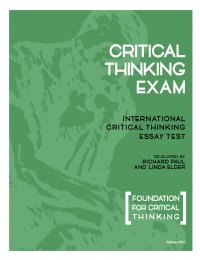
The purpose of the International Critical Thinking Test is to provide an assessment of the fundamentals of critical thinking that can be used with content from any subject. The goal of the test is two-fold. The first goal is to provide a reasonable way to pre- and post-test students to determine the extent to which they have learned to think critically. The second goal is to provide a test instrument that stimulates the faculty to teach their discipline so as to foster critical thinking in the students.
Once faculty become committed to pre- and post-testing their students using the exam, it is natural and desirable for them to emphasize analysis and assessment of thinking in their routine instruction within the subjects they teach. The exam, therefore, is designed to have a significant effect on instruction.
The test is designed to have high consequential validity; that is, the consequence of using the test is significant: faculty tend to re-structure their courses to put more emphasis on critical thinking within the disciplines (to help students prepare for the test). It also has the consequence that faculty think through important critical thinking principles and standards
(which they otherwise take for granted)
The International Critical Thinking test differs from traditional critical thinking tests in that traditional tests tend to have low consequential validity; that is, the nature of the test items is such that faculty, not seeing the relevance of the test to the content they teach, ignore it.
The International Critical Thinking Test is the perfect test to teach to. For one, the structure and standards for thought explicit in the test are relevant to thinking in all departments and divisions. The English Department can test their students using a literary prompt. The History Department can choose an excerpt from historical writing; Sociology from sociological writing; etc. In one case, a section from a textbook may be chosen; in another, an editorial, in a third, a professional essay. In short, the writing prompt can be chosen from any discipline or writing sample.
What is more, since to make the test reliable the faculty must be intimately involved in the choosing of the writing prompt and in the grading of tests, faculty are primed to follow up on the results. Results are seen to be relevant to assessing instruction within the departments involved.
The International Critical Thinking Essay Test is divided into two parts: 1) analysis of a writing prompt, and 2) assessment of the writing prompt. The analysis is worth 80 points; the assessment is worth 20. In the Analysis segment of the test, the student must accurately identify the elements of reasoning within a written piece (each response is worth 10 points). In the Assessment segment of the test, the student must construct a critical analysis and evaluation of the reasoning (in the original piece).
Each student exam must be graded individually by a person competent to assess the critical thinking of the test taker and trained in the grading called for in this examination. In evaluating student exams the grader is attempting to answer two questions:
The International Critical Thinking Test Is Available to Educational Institutions Under Three Different Options